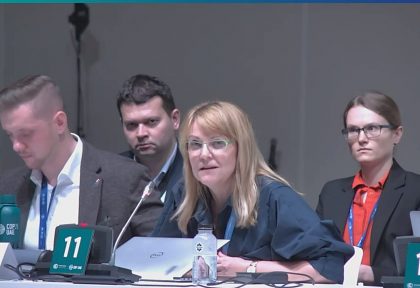
You can read about the outcomes of the GST in our blog, In this article we offer insights from the world of emissions reporting.
At COP28 in Dubai, United Arab Emirates, in early December 2023, a significant milestone was achieved with the successful completion of the multilateral evaluation process for the Fifth Biennial Report of the Slovak Republic. This report details the country's fulfillment of obligations stemming from the COP20 decision in Lima, under the UN Framework Convention on Climate Change.
The presentation was based on the 8th National Communication of the Slovak Republic on Climate Change, along with the Fifth Biennial Report, and the annual National Inventory Report. These documents underwent evaluation by the UN's international expert review team. The Slovak Republic's delegation then provided a summary of the progress made in fulfilling obligations since the last multilateral assessment. After responding to several questions from the parties, the Slovak Republic's multilateral evaluation process was concluded successfully. Looking ahead, this evaluation format will be superseded by a new system under the Enhanced Transparency Framework (ETF) of the Paris Agreement.
The Eighth National Communication, submitted alongside the Fifth Biennial Report on Climate Change, complied with mandatory sections as dictated by the Convention's technical committees. It included chapters on national circumstances, inventories of greenhouse gas emissions, policies and measures, and Slovakia's legislative framework for addressing climate change, reducing emissions, emission projections and trends through 2050, adaptation measures, projects, development aid programs, and initiatives in education and science related to climate change.
The review process for both reports encompassed several stages. Following their submission at the end of 2022, a technical evaluation was conducted by an independent team of UN experts, culminating in a report formulated through a series of questions and answers. Subsequently, the platform was opened for all Convention parties to pose additional inquiries. Slovakia responded to these queries in writing, with questions posed by Canada, Australia, New Zealand, and Great Britain. The final stage involved a public presentation during a UNFCCC-SBI session, featuring a pre-recorded presentation and subsequent questions from attending experts (MA Process). This comprehensive procedure is known as the ICA* process.
Due to the UNFCCC Secretariat's initiative to expedite the MA process, the pre-recorded presentations were not shown. Instead, Mr. Šimon Lacena (MŽP SR) delivered an opening address, summarizing recent trends in emissions and updates on decarbonization efforts in the energy sector, including electricity production, industry, and heat production renewal projects. This led to a question round, with inquiries from Great Britain and Sudan focusing on carbon taxes related to expanding the EU ETS scheme to buildings and transport, the domestic MRV system for policies and measures, and strategies in agriculture and forestry sectors.
All questions were addressed. The decision to forego the presentation video was seen as a missed opportunity to engage more experts and clarify the context for their questions. Nonetheless, this marked Slovakia's final MA. From next year, the new ETF system will take effect, under which the first BTR report, due by the end of the following year, will undergo assessment in the FMCP* process.
The entire video is available here: https://unfccc.int/First_MA_fifth_IAR_cycle.
*see our Glossary for abbreviations and terms

